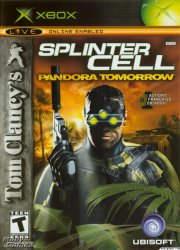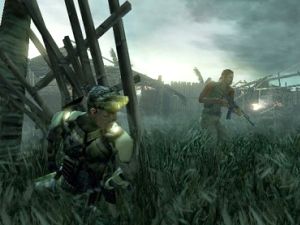March 04, 2007 7:05AM
Splinter Cell: Pandora Tomorrow

Splinter Cell: Pandora Tomorrow is the second game in the Splinter Cell series, and was released in 2004 to glowing reviews all around (92.3% average score according to gamerankings.com). The game was developed by Ubisoft Shanghai, not Ubisoft Montreal (who created the original Splinter Cell) and although it was made by another group of people, you really can't tell, as they did a great job at taking what Ubisoft Montreal put together, and refine it into pure stealth awesomeness.
I was actually at a disadvantage going into the game; as you probably know, I didn't get this game at release, I only picked it up a week or two ago, so I've had about three years of time to hear what other people have to say about the game, and just the general consensus on if it's good or not. As you also now, it wasn't until about a month ago that I even realized I liked Splinter Cell (I in fact love it now), so I never really cared what people said about what they liked and disliked regarding Splinter Cell, but for some reason I store all that information in my brain. Anyway, to get back on point, for the last few years I've heard nothing but people complain about Pandora Tomorrow. They never give specifics, and I never really see argument, I just kinda knew that people didn't approve, but of course I wouldn't let that stop me from buying it (I bought Warrior Within didn't I?) but it did make me expect some horrid play experience, but that wasn't what I received. I've asked in message boards what it is about Pandora Tomorrow that people generally dislike, and I've never really gotten any worthwhile replies, only that it features 'trial and error' gameplay, but the first Splinter Cell was exactly the same in that fashion so I don't believe that's a valid argument if you like the first and not the second.
Trial and Error gameplay is a pretty general description, and you can pretty much say that about any type of game, but what it means basically, is that the game is broken down into small chunks (one or two rooms between checkpoints), and the purpose of the game is to figure out the best way to make it through the rooms without being detected, injured or killing civilians, and you figure out the best way through trial and error. You try something, and if it doesn't work, it reloads, and you take what you've learned, and let your strategy evolve and you take another stab at it but slighty different, and with each attempt, you get better and better, until you can get through the rooms blindfolded, and on the other side you reach a checkpoint, and that's where you continue from. That is exactly the same way the first Splinter Cell played, and it's the way Pandora Tomorrow plays. A lot of the time you're simply replaying the same checkpoint over multiple times, refining your strategy until you have it down to a science, and then you move on. It's actually very satisfying most of the time, and while it may not be for some, it's a very basic concept, so I think most people could enjoy it.

Of course the first thing I noticed when I started to play Pandora Tomorrow was the giant leap from the graphics in Splinter Cell on Gamecube, to the graphics in Pandora Tomorrow on Xbox. Sam looked smooth and realistic, there was dynamic lights that moved, there were sweet physics, sound was very realistic... it was such a big leap, it really blew me away. Even by the end of the game I was still impressed with some of the effects, and how real things looked in some of the lighting.
One noticeable change made from the first Splinter Cell was... in the first Splinter Cell, a level would have checkpoints where you could restart if you died, but if you turned off the console you couldn't load there, and it had save points, where you could save and restart a level there. So a lot of the time you'd make quite a bit of progress but couldn't turn off the console. Well in Pandora Tomorrow, they got rid of non-saving checkpoints all together and just let you save at every checkpoint, which means that you can play the game in smaller chunks, or quickly reload a section if you had messed up. It really made the game feel more forgiving, easier to play in short amounts of time, and just all around better.
Although the game was a bit easier, and a bit shorter than the first Splinter Cell, the levels were quite a bit more creative and interesting (a jungle, a submarine, a moving train, a sewer) so that made up anything that was lost in making it shorter (or feel shorter).
As far as gameplay goes, I enjoyed Pandora Tomorrow a little bit more than the original because of the more creative levels and because of the more forgiving difficulty (thanks to the more frequent saving). The graphics were a big improvement, as was the sound. Although the story wasn't as good, it still was interesting, and had me wondering what would happen next. If I had to recommend one or the other, I'd have to recommend Pandora Tomorrow, but since I don't have to pick, I say play them both assholes!
Next is Splinter Cell: Chaos Theory, which is everyones favorite, so I can only imagine how good it is. I'll be starting it soon, so I'll let you all know.
Oh yeah, and if you want to waste some time and actually see what the gameplay looks like (kinda), you can watch this video here: http://youtube.com/watch?v=Fu0abD0RB1M. It shows a bit of gameplay, so you can see what I spent my night doing.
988 words
Timeline
- I lived on Grey St.
- Michelle was my Roommate
Leave a Comment
Your email address will not be published. Required fields are marked *